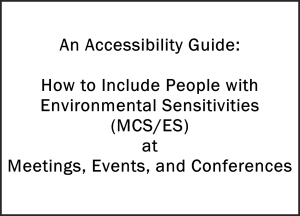I ran across a sign that the lung association had created, and while I am glad they are doing something , I found the message and visual required some tweaking.
Of course, the lung association didn’t come up with the term “sensitive”, it’s what is used in human rights laws, but it seems to have created an impression in the public’s mind that chemical and environmental sensitivities are trivial, and not disabling or even life threatening like they can be.
It also needs to be said that signs without enforcement are endangering lives and perpetuating harm, systemic accessibility barriers, discrimination, and forced isolated segregation for those who are disabled by any or repeated exposures.
To download printable posters, see below.










